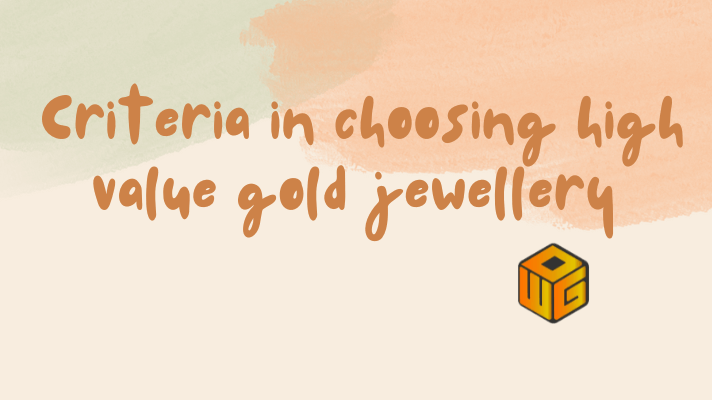Many of us wish to buy jewellery items and used them as decorations. Though this idea makes sense, it is highly suggested to leverage gold jewellery as an asset. The thing is, not all gold jewellery items can be considered high-value assets. The most significant caveat with gold jewellery is 25% to 40% spread margin. Some jewellery items are not acceptable for selling or for pledging the gold for a quick loan from Ar-Rahnu centre.
The gold purity of either 999 or 916
Consider buying gold items of 999 (24 karats) or 916 (22 karats) purity/fineness because these percentages have a high value in the long run. However, the gold purity of 999 is rarely made in gold jewellery because it is too soft.
Typically, the gold items of 999 purity are made for long-term savings or for pledging purposes, not for decoration per se. Certain Ar-Rahnu centres do not accept 999 pure gold for pledging for quick loans. Hence, it is more appropriate to get 916 purity gold items. This information can be easily checked by looking at the items stamps of either 999 or 916.
Go for compact jewellery (not hollow ones)
Get the compact items to facilitate the purity testing process using densimeters. This device checks if the items we pledge are solid or hollow, which is essential to accurately measure the items' value.
Furthermore, gold jewellery that is solid/compact does not break easily or get distorted, dented, etc. We have no choice but to trade in the items as used items at a spread margin of 25% if the gold items are not in good shape. For my Muslim friends, the requirement for tithe on gold is still applicable to broken gold jewelleries even if the items are not actively worn. Such items will be classified as ‘non-wearable jewelleries’.
Gold jewelleries without stones
Gold jewelleries with stones are invaluable upon selling, and they are not even accepted in Ar-Rahnu centre. Typically, 916 purity gold jewelleries do not have stones as part of their design. If they do, most likely they require lower purity of gold to hold the stones.
There are many cases where the gold jewelleries are claimed to be 916 and have stones on them, hence indicating that some mixture of non-916 is also there. We might be buying low purity gold at a 916 gold price rate if we are unaware.
Retain the original receipts
The best place to sell is usually where we bought the item. For instance, if we purchase the gold jewellery at Poh Kong, that is the ideal place to sell back in the future, provided that we have the original receipts intact. With receipts intact, the shop would typically pay a higher rate.
Based on experiences shared across gold sellers, the margin would be between 15% to 20% from the current gold price if original receipts are available. Without the receipts, however, the margin would begin at 25%, and the difference can result in losing a considerable amount of money.
Having receipts is crucial for selling the items in the future, and it is also helpful in pledging quick loans at Ar-Rahnu centres. Some centres would require the original receipts before proceeding to the next step.
Do not go for white gold
White gold is sold at the rate of platinum, another valuable precious metal, but the funny thing is that this metal has no second-hand value.
Such gold has a content of either 75% or 37.5%, with other contents being metals of different origins. White gold looks precisely like silver, but with the stamp of either ‘750’ or ‘375’, we can easily decipher the gold content.
Certain gold jewellery shops would be willing to buy back the white gold at a 30% spread margin, provided the original receipt is provided. Without the original receipt, the spread margin would be 50%. Regardless of the situation, it is not worth owning white gold in the long run.
Lowest cost of workmanship
We always fall for the low gold price displayed in the gold jewelry shops. Typically, this is not the final price because the workmanship cost has yet to be added.
Different shops offer different rates even if they sell the same design. This means the workmanship costs can be negotiated, which would lower the overall cost. Some gold shops would not charge for workmanship to attract customers. Similarly, we could negotiate the workmanship cost from RM200 to RM50. Therefore, there is a high potential to save money from gold jewellery shop owners depending on your negotiation skills.
These are some tips that can be considered while buying gold jewellery. Hopefully, we could have gold jewellery that can serve as jewellery and a high-value asset by employing these tips.
Should you find this article useful, consider sharing this with your friends and family. Let's create awareness about gold savings because nobody will come forward to help us.
Easy way to start gold savings can be found here: Gold Accumulation Program
Join my Facebook page for free here: FB page
Hope you find it useful.
Your buddy on gold investing,
Naresh G

